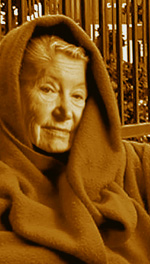HELPING OUR SENIORS
Helping Homeless Seniors Off the StreetsPamela B. Smith, Director, County's Aging & Independence Services
streets move into winter shelters. A few of the faces are those of seniors. There would be more of those faces, except for a special program that helps older adults secure housing again. The Transitional Housing Program works year-round to find temporary living spaces for “Homeless seniors tend to be a different population from other homeless people,” says Paul Downey, CEO of Senior Community Centers, which coordinates the program. “A smaller percentage of them are mentally ill or have substance abuse problems. The majority just had something bad happen to them.” One of the biggest factors is the cost of rentals. With some older adults living off only Social Security, they’re trying to make ends meet on $800 a month. Some single-room occupancy (SRO) hotels in downtown San Diego now charge $625 to $650 a month, Downey says. “When you’re paying 80 percent of your income on housing, and you get robbed or you make a bad decision with your money and you can’t pay the rent that month, things spiral down. If you can’t make up the money that next month, you get evicted.” The other common cause of homelessness among seniors is people in their early 60’s who lose their jobs, live off their savings while they try to find another job and have trouble locating something that pays them enough. Some of them lack skills necessary in today’s technology society. “It’s retraining,” Downey says. “A lot have never touched a computer. Even working at McDonald’s you have to know how to use technology.” Downey says that because homelessness is a new and frightening existence for many of these older adults, they’re highly motivated to find a solution. “They’re willing to do whatever we suggest to get out of this situation,” he says. The Transitional Housing Program is an important step in this solution. The County of San Diego funds this project jointly with the City of San Diego. It is also partially supported by donations from the public. The City pays for seniors to live in the Sara Frances Hometel downtown, which is across the street from the Senior Community Centers Broadway center that provides lunch, sponsored through the County’s nutrition program. The County also covers the cost of social services to assist the previously homeless seniors to get back on their financial feet. Plus Aging & Independence Services staff members from Adult Protective Services and the Senior Team provide case management and other assistance as needed. Sharp HealthCare also has a clinic nearby that regularly assists these seniors. The Transitional Housing Program funds 36 rooms at the Sara Frances at any one time, plus two assisted living units at St. Paul’s Manor for seniors who need extra care. Downey says they expect to utilize about 10,000 “bed nights” during this calendar year. The same person might need the program’s help to pay for the same apartment for a month or two before being able to pay for the space on his/her own. “Usually within six to eight weeks, they’re ready to start paying rent for themselves,” he says. “The temporary housing allows them to save a little bit, so they’re not right on the cusp again economically.” Some of the participants are able to move into the Potiker Center, which Senior Community Centers also manages. These are low-These are low-cost apartments for older adults in the East Village of downtown San Diego. Another similar complex, currently named City Heights Square, is being built to open this summer in City Heights. There’s already a list forming of interested residents. Downey says the Transitional Housing Program is a model for other cities, indicating that Los Angeles officials have recently studied this program for use with their homeless seniors. “We’re getting a lot of attention. The partnership of the city, county and private nonprofit working together on this issue is unique,” he says. “And over 90 percent (of the seniors) have been successfully transitioned. That’s a remarkable number.” People interested in making donations to assist the Transitional Housing Program can send checks made out to Senior Community Centers, 525 14th St., San Diego 92101. Indicate on the check that the donation is to assist homeless seniors. |
|
![]()
Salud+HealthInfo is for information and educational purposes only. You should not rely on this information as a substitute for personal medical attention, diagnosis or hands-on treatment. If you are concerned abut your health or that of a child, please consult your family's physician or health provider immediately and do not try to diagnose yourself.
 info
info
 seniors unable to afford housing on their own. Social workers help them link to benefits and resources, then sit down with them and work out goals to make the necessary changes to avoid becoming homeless again.
seniors unable to afford housing on their own. Social workers help them link to benefits and resources, then sit down with them and work out goals to make the necessary changes to avoid becoming homeless again.